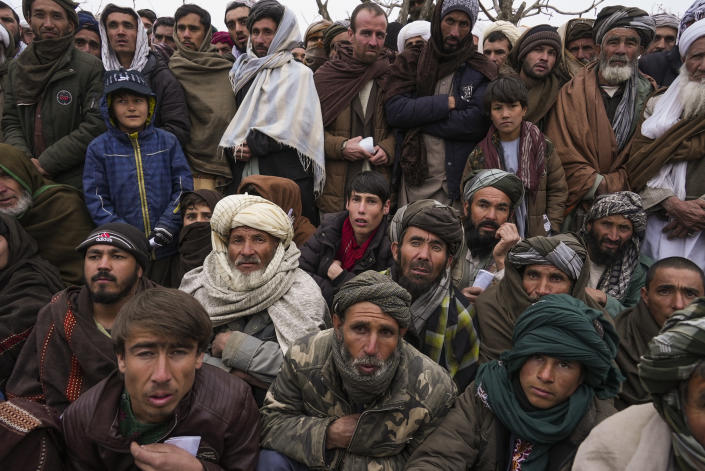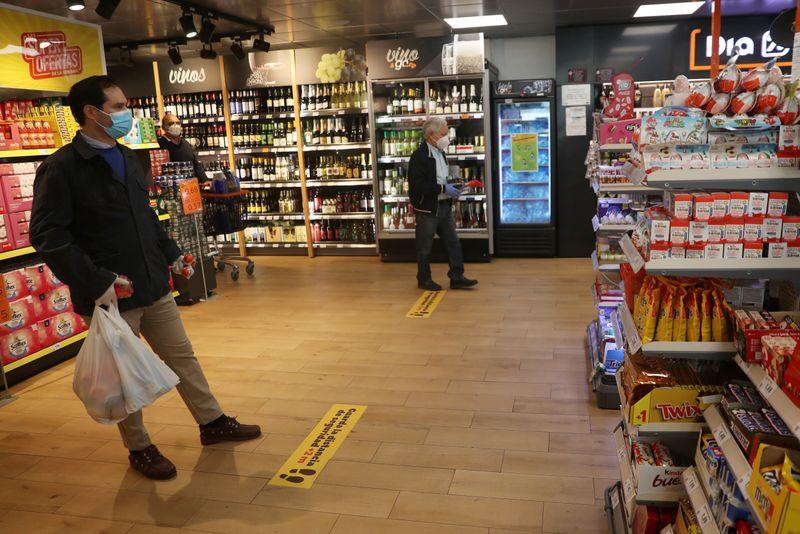UN seeks $5B to aid millions of Afghans as country struggles
 Hundreds of Afghan men gather to apply for the humanitarian aid in Qala-e-Naw, Afghanistan, Tuesday, Dec. 14, 2021. (AP Photo/Mstyslav Chernov, File)
Hundreds of Afghan men gather to apply for the humanitarian aid in Qala-e-Naw, Afghanistan, Tuesday, Dec. 14, 2021. (AP Photo/Mstyslav Chernov, File)The United Nations on Tuesday launched its biggest ever appeal — for over $5 billion to help 22 million Afghans whose country is on the brink of a humanitarian crisis and economic collapse as well as 5.7 million Afghan refugees in five neighboring countries.
The U.N. said the appeal will be followed by a pledging conference in mid-March. But a number of nations announced new funding, including an additional $308 million from the United States and $500,000 from Israel, and there were indications that more funds will be coming from other mainly Western nations.
U.N. humanitarian chief Martin Griffiths, who called the campaign “the largest ever appeal,” said statements during the two-hour hybrid launch event were “encouraging” because there is a high degree of consensus on the increasingly desperate needs of the Afghan people.
The Afghan appeal for 2021 was the best-funded, he said, and “we are confident that member states solidarity and generosity will come through in 2022.”
The issue of helping the Afghan people has been complicated by the Taliban takeover of the country in August as U.S. and NATO forces were in the final stages of their chaotic withdrawal from the country after 20 years.
The Taliban initially promised tolerance and inclusiveness toward women and ethnic minorities but their actions so far, including renewed restrictions on women and the appointment of an all-male government, have been met with dismay by the international community — including many donors.
Afghanistan’s aid-reliant economy was thrown into deep turmoil following the Taliban takeover. The Afghanistan central bank’s $9 billion in reserves, most of which is held in the United States, were frozen and the International Monetary Fund blocked about $450 million because of a “lack of clarity” about a new government.
The Taliban leadership has banned all foreign currency transactions while urging the U.S. to ease sanctions and release Afghanistan’s overseas assets so the government can pay teachers, doctors and other public sector employees.
The joint appeal seeks $4.4 billion for the U.N. and its humanitarian partners to help 22 million people in Afghanistan, about half the country’s population. It calls for $623 million for the 5.7 million Afghans who fled abroad to neighboring Iran, Pakistan, Tajikistan, Uzbekistan and Turkmenistan.
The funding, if achieved, would amount to the equivalent of about one-fourth of the country’s total economic output in 2020, of more than $20 billion, according to the World Bank.
Last month, Griffiths warned that Afghanistan’s economic collapse “is happening before our eyes” and urged the international community to take action to stop “the freefall” before it leads to more deaths.
He said donor nations need to agree that in addition to emergency humanitarian aid they need to support basic services for the Afghan people including education, hospitals, electricity and paying civil servants — and they must inject liquidity into the economy which has seen the banking system “pretty well shut down.”
Afghanistan’s ambassador in Geneva, Nasir Ahmad Andisha, who represented the former government and is still recognized by the U.N., told the meeting that “Afghanistan is unfortunately experiencing the worst humanitarian crisis of its contemporary history, and perhaps one of the worst in the world.”
“My country is facing simultaneously an economic downfall, food insecurity, banking and fiscal crisis, climate change and unemployment, (and) over and above all a reversal of fundamental rights and freedoms including sidelining half of its population,” said Andisha.
He has accused the Taliban of committing targeted killings, enforced disappearances and other rights abuses since August.
Andisha urged unimpeded humanitarian access to all areas of the country for U.N. agencies and their humanitarian partners.
The International Refugee Committee said its staff have seen a thirtyfold increase in the severest form of child malnutrition between November and December in western Herat and a twofold increase in southeastern Khost.
The organization, which has worked in Afghanistan since 1988 and now operates in nine provinces, said food prices have risen an estimated 10% to 20% compared with the past five years, and in December the cost of wheat, fuel and flour were almost 50% higher than in the last week of June.
While “a full-blown humanitarian catastrophe looms, the world is perplexed and looking for the right way to react,” Griffiths said.
“My message is urgent, don’t shut the door on the people of Afghanistan,” he said. “Help us scale up and stave off widespread hunger, disease, malnutrition and ultimately death by supporting the humanitarian plans we are launching today.”
U.N. refugee chief Filippo Grandi said that “the international community must do everything it can to prevent a catastrophe in Afghanistan, which would not only compound suffering but would drive further displacement both within the country and throughout the region.”
He said security and resources will spur the return of refugees and aid opens a space for dialogue with the Taliban on issues that matter to donors including the rights of women and minorities.
“The Afghan people cannot pay once more after 40 years for the political gaps and mistakes that have been committed in the past, and this is a very strong message from us,” he said in his final remarks to the appeal launch, adding that the U.N. will continue to pursue the rights of women to education and work and the rights of minorities.
—-
SOURCE: Associated Press











